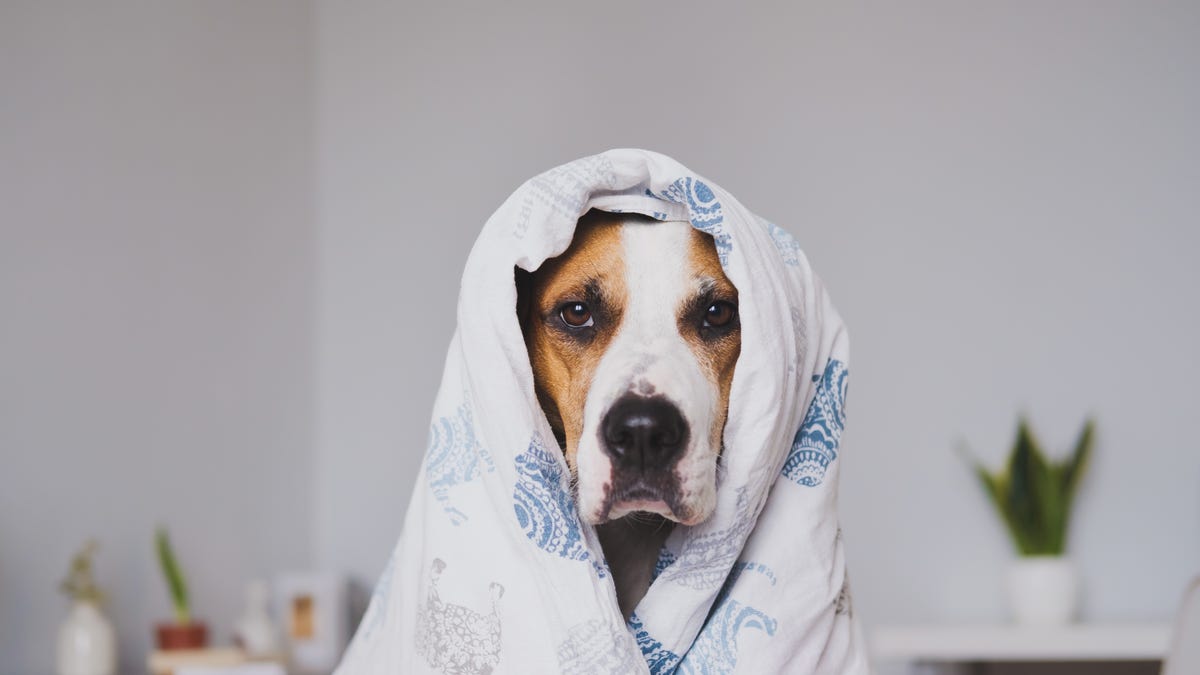COVID vaccines for dogs and cats? What to know about vaccines and testing for pets
Several animal species have tested positive for COVID-19. Cats and dogs can't be vaccinated yet, but you can protect your furry friends in other ways.

Though dogs can get COVID-19, they're unlikely to get severely ill or spread the disease to humans.
Throughout the COVID-19 pandemic, research has shown that pets and other animals can catch the coronavirus. According to the US Department of Agriculture, at least 15 species of animals, including domestic pets and wild animals, have contracted COVID-19. So will there be a feline or canine vaccine for COVID-19?
Don't hold your breath. Simply put, pets are unlikely to get severely sick from the coronavirus and also unlikely to pass COVID-19 to humans. According to the US Food and Drug Administration and the Centers for Disease Control and Prevention, the risk of animals spreading COVID-19 to humans is low. And domestic pets also don't live in zoos, where many animals have been given an experimental COVID-19 vaccine from the veterinary pharmaceutical company Zoetis, either out of an abundance of caution for their endangered status or the fact that they may encounter hundreds of "oohing" and "aahing" humans each day. The virus is also more likely to make some animals more sick than others.
"A vaccine is quite unlikely, I think, for dogs and cats," Dr. Will Sander, an assistant professor in the Department of Veterinary Clinical Medicine at the University of Illinois Urbana-Champaign, told The New York Times in a mid-November report. "The risk of disease spread and illness in pets is so low that any vaccine would not be worth giving."
So, how can I protect my pet from COVID-19?
Pets getting COVID-19 is uncommon. The FDA reports that a "very small number" of pets around the world have tested positive for COVID-19. An even smaller number of them will get very sick from COVID-19.
If a dog or cat does get sick, they may have humanlike symptoms of COVID-19, including fever, cough, difficulty breathing, sneezing, runny nose, diarrhea and vomiting, per the CDC. Because the coronavirus that causes COVID-19 spreads to pets during close contact, avoid kissing, petting, snuggling or sleeping in the same bed as your pet if you are sick with COVID-19, the CDC says. If someone in your house tests positive for COVID-19, keep that person isolated from everyone, including the pet, if possible.
Disaster preparedness can also protect pets during the pandemic. The ASPCA recommends keeping an emergency kit with at least two weeks of pet food and a month of pet medication. It also advises selecting a "designated caregiver" for your pets in case you are unable to help them for any reason.
Although there aren't any cat or dog vaccines for COVID-19 yet, keeping up with your own vaccinations (including a COVID-19 booster dose) helps protect everyone in your household, including the animals.
How not to protect your pet from COVID-19
Don't put a mask on your dog or cat, the CDC says. Also, do not "wipe or bathe your pet with chemical disinfectants, alcohol, hydrogen peroxide or other products," including hand sanitizer and other cleaners. There is currently no evidence to suggest that the virus that causes COVID-19 can spread from a pet's fur.
Don't put a mask on your dog.
Can I get my pet a COVID-19 test?
If you think your pet has COVID-19 or is sick for any reason, call your veterinarian. (However, if you have COVID-19 yourself, don't go see a veterinarian in person.) According to the CDC, testing for pets may be recommended if the animal has had direct contact with a person with COVID-19. However, veterinarians are "encouraged to consider other, more common causes of illness in animals and should use their clinical judgement when deciding whether to test animals for SARS-CoV-2," per the agency. Which means, given the low frequency of pets getting symptomatically ill with COVID-19, another bug or illness might be causing your pet to feel a little under the weather.
If your veterinarian decides to test your pet, it will be through an oral, oropharyngeal (throat) and/or rectal swab, according to the CDC.
What about the minks?
At the end of 2020, Denmark's government ordered millions of minks be killed over revelations that the animals were catching COVID-19 from mink farmers and transmitting it back to humans. The phenomenon of mink-to-human spread of COVID-19 has been reported in Denmark, the Netherlands, Poland and possibly the US, according to the CDC. According to Fur Commission USA, there are over 275 mink farms in 23 states in the US. At such farms, the animals are bred and killed for their pelts and other body parts, for use in clothing, cosmetics and other materials.
In response, animal vaccine-makers, most notably Zoetis, started working on shots for minks, The New York Times reported. The pharmaceutical company, which started working on a vaccine for dogs and cats in 2020, said in January that it shifted its focus to minks and that "it's not uncommon to adapt vaccines for experimental use in other species." In July, Zoetis said it was donating more than 11,000 doses of its experimental COVID-19 vaccine to zoos, conservatories and sanctuaries in 27 states.
The USDA is currently only accepting applications for animal COVID-19 vaccines for mink. Other animals (like zoo animals) can only get vaccinated on a case-by-case basis, with USDA and state veterinarian approval. Wisconsin Public Radio reported in July 2021 that the state's Department of Agriculture, Trade and Consumer Protection approved Zoetis' vaccine for minks in May. Wisconsin produces the most mink pelts in the US.
Mink farms breed and kill the animals for their fur and other byproducts. There have been outbreaks of COVID-19 on mink farms.

